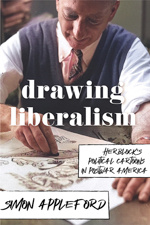Today, we are happy to bring you our conversation with Simon Appleford, author of DRAWING LIBERALISM: Herblock’s Political Cartoons in Postwar America.
What inspired you to write this book?
I’m really interested in the role that popular culture—and especially visual media such as cartoons and comics—plays in shaping American life and thought. There’s been a lot of great recent scholarship around comic strips and serialized comic books, but political cartoons have often been overlooked by historians as a source. As Herblock himself said, political cartoons are meant to be opinionated and often say things that written editorial content cannot. This made me interested in what role cartoons have played in helping the public understand the world around them. Block’s long tenure at the Washington Post and his friendship with many of liberalism’s intellectual figures made his work a natural lens through which to explore these questions in the context of postwar America.
What did you learn and what are you hoping readers will learn from your book?
Exploring the postwar period through Herblock’s cartoons genuinely made me look at some very familiar events and personalities in a new light and I hope that readers will have a new understanding of a period in American history that still looms so large in our collective experience. I also hope that readers gain an appreciation for the importance of both political cartoons and newspapers and the crucial role that they play in protecting a free and civil society, especially at a time when media consolidation is having such a devastating impact on access to local news.
What surprised you the most in the process of writing your book?
I don’t think I was ready for the vehemence with which some of Herblock’s detractors lashed out at him because of his cartoons. Block received countless personal insults, antisemitic language, and veiled threats of violence from around the country and even internationally—all of which reinforced one of my central arguments about the role his cartoons played in shaping the public’s relationship with postwar liberal ideology. While many of the worst notes that he received were written anonymously, even more came from doctors, lawyers, lobbyists, and other professionals who openly wrote under their personal and professional letterheads. People are often warned not to read the comments section of a website and the same could be said about some of Block’s correspondence!
What’s your favorite anecdote from your book?
It’s so hard to choose, but I really enjoy the discussion of some of Block’s earliest cartoons from before the Second World War. This was a formative period for him both artistically and professionally and the cartoons from this period are very different to those from his time at the Post for which he is best remembered. His December 3, 1938 cartoon critiquing the excesses of the Dies Committee and its investigations into alleged subversive activities (which is reprinted in the book) is one of my favorites from across his entire career. It deals with a serious topic, but is genuinely laugh-out-loud funny and anyone reading it would immediately understand what Block was trying to say about the political climate of the time.
What’s next?
I’m currently leading an NEH-funded project that is digitizing and making accessible materials related to Prince Maximilian von Wied’s 1832–34 expedition through the American Midwest, which created an important visual and textual record of the environment and peoples they encountered. I’m also looking forward to spending a little more time with my children, who are suitably unimpressed that their father has written a book!





